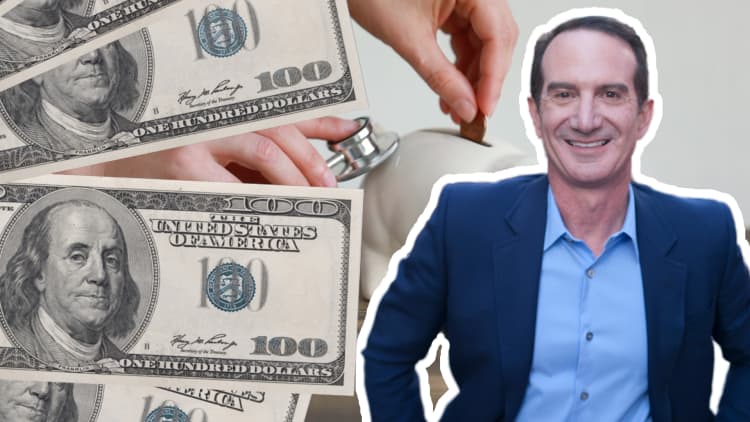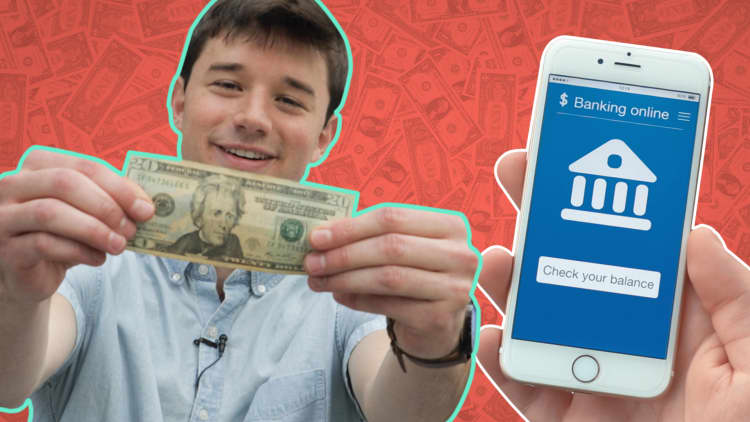There are countless financial tasks to prioritize, if you're able, before an economic downturn: Pay off high interest debt, put major purchases on hold and review your investment allocation. But the most important task, experts say, is to increase your savings rate as much as you can.
Having a sizable emergency fund is one of the most commonly given bits of personal finance advice. But with a potential recession and the instability it brings, it's even more important to cut back on whatever expenses you can.
A recession can lead to a job loss or reduced income, general economic instability and limited opportunities for job change or salary growth. But fixed expenses — rent, student loans, groceries and credit card payments — don't pause if you lose your job or have your hours cut, which makes having a robust savings account a top financial priority.
"In the event a recession happens and your company downsizes, the emergency reserve can bridge the gap during your unemployment and ensure that you are not using credit cards or your retirement account to fund your living expenses," Matthew Schwartz, a Minnesota-based certified financial planner, tells CNBC Make It.
This is even more pressing for millennials. "As they pitch toward middle age, [millennials] are failing to make it to the middle class, and are likely to be the first generation in modern economic history to end up worse off than their parents," writes Annie Lowry, a staff writer at The Atlantic. "The next downturn might make sure of it, stalling their careers and sucking away their wages right as the millennials enter their prime earning years."
In fact, middle class life is now 30% more expensive than it was 20 years ago, according to Alissa Quart, author of "Squeezed: Why Our Families Can't Afford America," while the cost of housing in big cities has quadrupled and the price of college has doubled. To compound that, salaries have stagnated and cover far less than they did just a few decades ago.
All of this can make covering day-to-day expenses difficult. That's why building savings habits into your life is one of the best ways to ensure stability in a rocky economic environment.
How to build your savings
The first step to start saving is to examine how you currently spend your money. One way to do this is to record each purchase you make for a few months, either by keeping track in a notebook, an Excel sheet or an app like Mint or Personal Capital, certified financial planner Carolyn McClanahan told CNBC Make It. Once you can actually see all of your expenses in one place, you can determine where to make cuts.
You can also implement the 50/30/20 budget, popularized by Democratic presidential candidate Elizabeth Warren, which suggests the following: 50% of your income should go toward "must haves" (monthly bills like housing, transportation, etc.), 30% toward "wants" (discretionary spending) and 20% toward savings.
Once you have your spending under control, determine a specific savings goal to work toward. To start, financial advisors recommend putting away three to six months' worth of living expenses for an emergency fund. But if a possible recession is stressing you out, aim for more than that. As Suze Orman, financial expert and best-selling author of "Women and Money," said in 2017, the Great Recession was a major wake-up call that three to six months' worth of funds isn't always enough if the worst happens.
"You need as much money in the bank that makes you feel secure," Orman said. "Don't go fooling yourself, 'It's okay, I can charge on a credit card, I can do this.' You should have at least eight months. Not six months, not three months, I'd like to see you have eight months to one year."
Schwartz agrees, advising people to consider how long it typically takes a job seeker — in their own industry, specifically — to find a new job, or what would happen if you are self-employed and suddenly find yourself with fewer clients.
"Some people simply feel more comfortable with more than six months in cash," he says. "Ultimately, it is about sleeping well at night knowing that an emergency expense will not derail your long term plans."

Whatever number you decide on, write it down and detail why that amount is important to you. It's much easier to achieve a goal if you have concrete reasons and the inspiration to pursue it.
It's ideal to save 10% of your income automatically each month outside of your retirement investments, Ramit Sethi, financial coach and author of the best-selling book "I Will Teach You to Be Rich," told CNBC Make It. But even a 1% savings rate is better than nothing if 10% isn't feasible. A recession isn't likely to come tomorrow, so start with saving $5 a day, and slowly build from there.
"My advice is to start saving 2% of take home pay and add 1% every six months until you think you can't add to it any further," Howard Dvorkin, a certified public accountant, tells CNBC Make It.
Automation is key. It takes procrastination and other temptations out of the equation. You can set up automatic transfers from your checking account to a high-yield savings account, or use an app like Digit, Qapital, Chime or Albert to save for you.
Overall, the most important step is to just start saving whatever you can, experts say. If you need more savings tips, here are a few to help you get started:
- 5 ways to save more money in 2018
- 6 money-saving tips that will make you feel smart
- 5 tips to save more money, from ordinary people who have paid off thousands
Don't miss: These older millennials made it through the Great Recession—here's what they wish they'd known
Like this story? Subscribe to CNBC Make It on YouTube!



